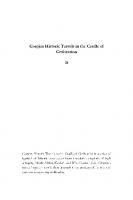Anabasis: With an Interlinear Translation, for the Use of Schools and Private Learners, on the Hamiltonian System, as Improved 9781463226701
Xenophon's Journey Upcountry, with interlinear translation.
267 53 52MB
English Pages 578 [566] Year 2010
Recommend Papers

- Author / Uploaded
- Xenophon Xenophon (editor)
- Thomas Clark (editor)
File loading please wait...
Citation preview
Anabasis
Gorgias Historic Travels in the Cradle of Civilization 28
Gorgias Historic Travels in the Cradle of Civilization is a series of reprints of historic travelogues from travelers to regions of high antiquity: North Africa, Western and West-Central Asia. Glimpses into a forgotten world, these journals show us many of the roots of our own present-day civilization.
Anabasis
With an Interlinear Translation, for the Use of Schools and Private Learners, on the Hamiltonian System, as Improved
By
Xenophon Edited and Translated by
Thomas Clark
1 gorgias press 2010
Gorgias Press LLC, 954 River Road, Piscataway, NJ, 08854, USA www.gorgiaspress.com Copyright © 2010 by Gorgias Press LLC Originally published in 1865 All rights reserved under International and Pan-American Copyright Conventions. No part of this publication may be reproduced, stored in a retrieval system or transmitted in any form or by any means, electronic, mechanical, photocopying, recording, scanning or otherwise without the prior written permission of Gorgias Press LLC.
ISBN 978-1-61719-226-5
Printed in the United States of America
ISSN 1935-3200
PREFACE.
interlinear edition of the Anabasis of Xenophon has been carefully translated by the editor of the Latin and Greek series of interlinear classics. His plan is somewhat peculiar, being intermediate between the systems of Hamilton and Locke. The uncouth and frequently unintelligible sentences of Hamilton are avoided, while on the other hand the verbal and grammatical meanings are given with an accuracy fully equal to his, if not surpassing it. By this plan the sense of the text is also conveyed more precisely than is done either by the plan of Hamilton or that of Locke—every idiomatic and grammatical difficulty being completely overcome. THIS
The work will be found of great service to the student of the Greek language, as it removes many of the difficulties so perplexing in its study. The use of a few signs and characters, explained on another page, has, in a measure, enabled the author to accomplish what he has above set forth. THOMAS CLARK. (iii)
EX P L A N ATI0N8
I n union of two or more words by hyphen! denote*, that t l s y togetluM express the meaning of one Greek word; as,
yiyvovrau. are-born. When two or more words, employed to express a Greek word, are sepa rated by one or more words placed between them, such interposition is denoted by a figure 1 prefixed to the word next preceding that interposed, and another figure ' placed before the next succeeding word; as,
ovTO 'having
noLvrag.
so
'disposed
&1L
An English word or sentence included within parentheses ( ) is an indi eation that such word or sentenoe is not oxpressed in Greek; as
atyixvelro 7 i p o $ avrov rdv used-to-come
to
him
napa ^ousiTJctg.
of-the (persons sent) from (the)
king.
When a word placed in parentheses is italicized, it shows that the word above it is either superfluous or not to be expressed in English; as,
¿Sovtero ra dft
hereafter (dependent) on
rtv Svwjrai he-could
— (his)
fiajaikevaei
he-would-reign
avr*
instead
ixeivov. Tlapvaarvg (¿ev 8n yi f/rmip vnnpx^
of-him.
Parygatis
indeed — the mother
went-for
—
Ki'pci, g (3ovM(ievo$
(him), as-if he-were-wishing
Hioíbag,
against (the) Pisidians,
ó§,
t¿n>
in-as-much-as,
the
HLOI&CJV
7Uxf£%óvro>v 7tpáy[iara tr¡ £¿>pa éavtov.
Pisidians
being-pretending
thing
in-the province of-himself
'Exetevae
XcKpouvetov
[foe the Tüidians infested his territories]. He-ordered also
SophaenetM*
BOOK I.—CHAPTER II.
16
TOP XrvfHpaXiov xcu 2o>xparvp/ rov 'Aratov, rovrov$ the
Stymphaiian
xcu ovrag also
and
Soeratea
%evovq,
the
Achaian,
then
TjctBovraq
being (hi*) guest-friocds, (that) | haying-taken [having collected]
7iteigrov$ av&pag as-many
ori
¿XSeiv,
no^fincri^
Turcaipepvei avv rotg tpvyaffi
he-was-aboat-waging-war against-Tissaphernea
ruv
Milesians.
And
they
5*
ovrag. ao.
II.
khoxsi a\rt(fi rfci
AFTKR indeed it-aeemed
to-him
7topev£g
barbarians.
He-orders
—
the
Greeks
| so
v6(wg avroig
to-have-been-arranged [so to be marshalled] as (was the) custom for-them
«5 no.%riv xcu arrival, in
battle,
and
8s
ixauarov
to-stand (in such order), but (that)
eaeh
owrd%cu rovg Savrov.
(eommander) was-to-arrange
| the
of-himself [his own men]. | 'They-
Ovv krdjfityaav em
irere therefore four deep];
'arranged
rerrapw.
in
fours;
M¿vav [lev &e, xcu oi Menon indeed —
[they were drawn up
Ovv avrci ei%e
and | (the) (those) with
To he^iov, 8s KXeapxpg xou oi sxsivov the
to
the
right,
but
EVQW(IOVJ
left,
Clearchus
oi
the
d/Uloi other
| and
the
of-him
him
had
[and his men]
orparriyoi 8s ro fisaov. commanders
' 0 K i p o s ovv (iev Tiporov — Gyrus therefore — first
—
the
centra.
e&scipei rovg fiapSapovg reviewed
the
barbarians
oi 8s 7tapn?uawov rsra/yfisvoi xa/rd I2ag xou — and they-marched-fast-him
drawn-up
in




![Interlinear Literal Translation of the Greek New Testament [1.0]](https://ebin.pub/img/200x200/interlinear-literal-translation-of-the-greek-new-testament-10.jpg)

![A New System of Meteorology Designed for Schools and Private Students [1]](https://ebin.pub/img/200x200/a-new-system-of-meteorology-designed-for-schools-and-private-students-1.jpg)


![Between the Twilights - An Interlinear Translation of the Syriac Orthodox Breviary (Third Edition) [3 ed.]
9781693971556](https://ebin.pub/img/200x200/between-the-twilights-an-interlinear-translation-of-the-syriac-orthodox-breviary-third-edition-3nbsped-9781693971556.jpg)